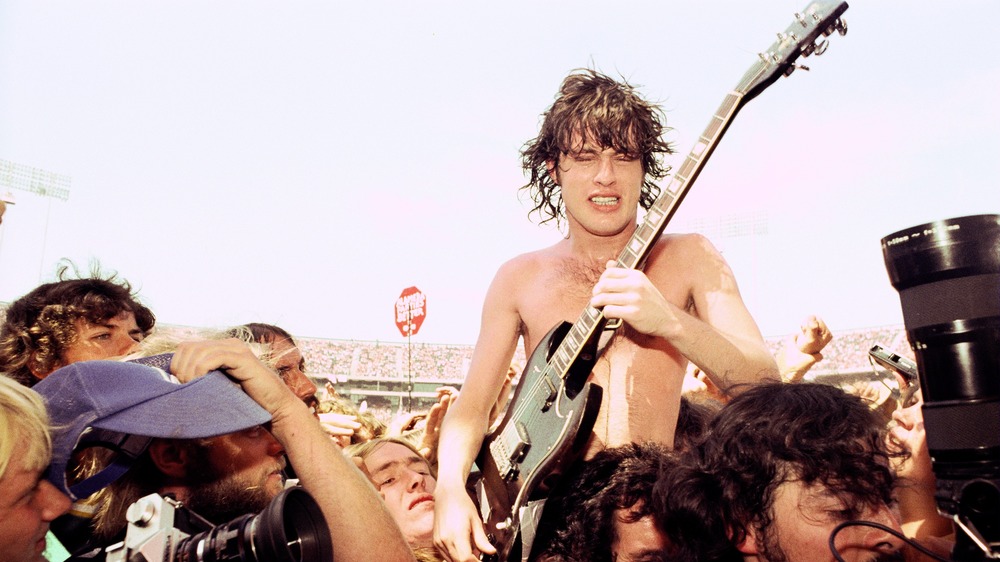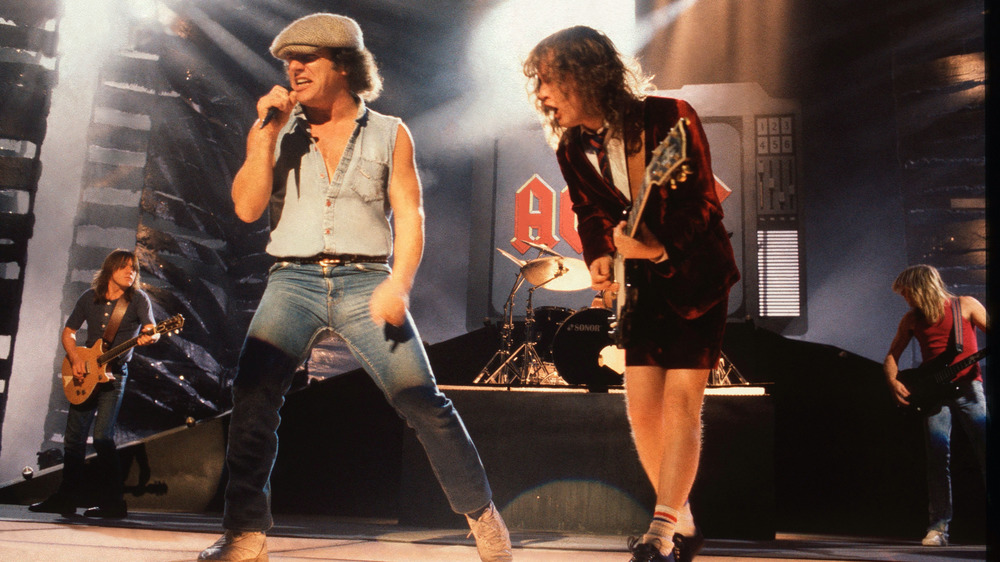This Is Angus Young's Favorite AC/DC Song Of All Time
AC/DC formed in Sydney, Australia in 1973 and is still going strong, in spite of a string of bad luck. Just a few years ago the band — which, according to The New York Times, has sold more than 200 million albums worldwide – seemed to be a dead letter. After founding member Malcolm Young left the band in 2014, suffering from dementia (as Ultimate Classic Rock reports, he passed away three years later) and lead singer Brian Johnson retired due to hearing problems in 2016 (also via Ultimate Classic Rock), it seemed likely we'd never get new music from what might be the tightest rhythm section in rock music history.
The band proved everyone wrong, however. Johnson overcame his hearing loss with an experimental treatment, and the band brought in Malcolm and Angus Young's nephew, Stevie, to take Malcolm's place. This year the band released Power Up, their 17th studio album, adding 12 more songs to the band's repertoire. The album debuted at the top of the Billboard charts with an impressive 117,000 album-equivalent sales, and made picking your favorite AC/DC song slightly more difficult.
Now imagine you actually wrote all those songs and had to choose a favorite. Angus Young, the band's lead guitarist (who still wears the schoolboy costume he's worn when performing since 1973) recently did just that. Unsurprisingly, he couldn't choose just one — so he picked two, and his choices might surprise you.
Riff Raff
Surprisingly, Angus Young picks the song "Riff Raff" from AC/DCs 1978 album Powerage as his favorite song if he's "thinking of the guitar." As Loudwire reports, "The guitar work was a challenge but interesting in the way the song rolled out. That's my guitar answer."
Although not the most universally known AC/DC song, "Riff Raff" has long been a fan favorite, and it definitely shows off Young's mastery of blues-based guitar riffs. As Rolling Stone Australia notes, the song opens with 40 seconds of Young playing unaccompanied, calling the song's intro "some of the most tension-filled and anticipatory in all of rock & roll." Recorded just a year or so before the band's smash hit breakthrough Highway to Hell, the song is a hint of things to come as Young matured into a reliable riff machine and the rest of the band tightened the precise rhythmic approach that would come to define its sound.
One of the best aspects of the song is the epic solo Young lays down. As Pop Matters reminds us, he recorded it in the control room of the studio, plugged directly into the console, capturing a near-perfect blast of musical passion with zero overdubs or corrections. No wonder the band brought the song back to its set list while touring with Axl Rose — who specifically requested it.
Thunderstruck
Angus Young's second favorite AC/DC song is not totally surprising, but it's not a world-famous track like "Back in Black" or "Highway to Hell." Instead, he chooses the fan-favorite "Thunderstruck," off their 1990 album The Razor's Edge. According to Loudwire, he says if he's choosing a favorite for "a whole song" instead of just the guitar work, he chooses "Thunderstruck," calling it "a big one."
The song remains one of AC/DC's most popular. The epic intro riff to the song, which Young plays throughout the entire nearly five-minute track, is still played at sporting events to pump up the crowd, making it familiar even to folks who don't know much about the band. As Rolling Stone Australia reports, Young says "It started off from a little trick that I had on guitar." According to British GQ, that "trick" was to tape up all the strings on his guitar except the B string (second from the bottom).
The band took that trick and built one of the best AC/DC songs of all time. Remarkably, Young played the riff the whole way through the song in one take, but just as important as his guitar playing is the arrangement. As noted by I Love Classic Rock, for the first minute of the song, it's just Young's incredible riff snaking around a steady thump of a beat while the band chants "Thunder!" The song is almost scientifically designed to build tension.


